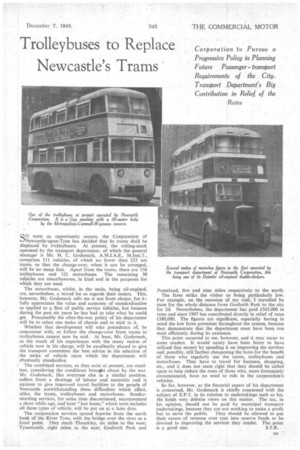Trolleybuses to Replace Newcastle's Trams
Page 29

If you've noticed an error in this article please click here to report it so we can fix it.
Corporation to Pursue a Progressive Policy in Planning Future Passenger transport Requirements of the City. Transport Department's Big Contribution in Relief of the Rates
So soon as opportunity occurs, the Corporation of Newcastle-upon-Tyne has decided that its trams shall be displaced by trolleybuses. At present, the rolling-stock operated by the transport department, of which the general manager is Mr. H. C. Godsmark, A.M.I.A.E., M.Inst.T., comprises 511 vehicles, of which no fewer than 223 are trams, so that the change-over, when it can be arranged, will be no mean feat. Apart from the trains, there are 136 trolleybuses and 122 motorbuses. The remaining 30 vehicles are miscellaneous, in kind and in the purposes for which they are used.
The motorbuses, whilst, in the main, being oil-engined, are, nevertheless, a mixed lot as regards their makes. This, however, Mr. Godsmark tells me is not from choice, for h!. fully appreciates the value and economy of standardization as applied to p. fleet of public service vehicles, but because during the past six years he has had to take what he could get. Presumably the after-the-war policy of his department will be to select one make of chassis and to stick to it.
Whether that development will take precedence of, be concurrent with, or follow the change-over from trams to trolleybuses cannot now be said. At least, Mr. Godsmark, as the result of his experiences with the many makes of vehicle now in his charge, will be excellently placed to give the transport committee the best advice in the selection of the make of vehicle upon which the department will etentually standardize.
The combined services, as they exist at present, are excellent, considering the conditions brought about by the war. Mr. Godsmark, like everyone else in a similar position, suffers from a shortage of labour and materials and is anxious to give improved travel facilities to the people of Newcastle notwithstanding these difficulties which affect, alike, the trams, trolleybuses and motorbuses. Sundaymorning services, for some time discontinued, recommenced a short while ago, and later' last buses," which term includes all three types of vehicle, will be put on at a later date.
The corporation services spread fanwise from the north bank of the River Tyne, with the bridge over the river as a focal point. They reach Throckley, six miles to the west; Tynemouth, eight miles to the east; Gosforth Park and Ponteland, five and nine miles respectively to the north.
The fares strike the visitor as being particularly low. For example, on the occasion of my visit, I travelled by tram for the whole distance from Gosforth Park to the city for 2d. Nevertheless, the department has paid £565,000 in rates and since 1907 has contributed directly in relief of rates 1380,000. The figures are significant, especially having in mind the low fares prevalent throughout the system, because they demonstrate that the department must have been run most efficiently during its existence.
This point occurred to me, however, and it may occur to some readers. It would surely have been fairer to have utilized that money by spending it on improving the services and, possibly, still further cheapening the fares for the benefit of those who regularly use the trams, trolleybuses and motorbuses. They have to travel for business, shopping, etc., and it does not seem right that they should be called upon to help reduce the rates of those who, more fortunately circumstanced, have no need to ride in the corporation's vehicles.
So far, however, as the financial aspect of his department is concerned, Mr. Godsmark is chiefly concerned with the subject of E.P.T. in its relation to undertakings such as his. He holds very definite views on this matter. The tax, in his opinion, should not be paid by municipal transport undertakings, because they are not working to make a profit but to serve the public. They should be allowed to put their excess of revenue over cost into reserve funds to be devoted to improving the services they render. The point
is a good one. S.T.R.




























































